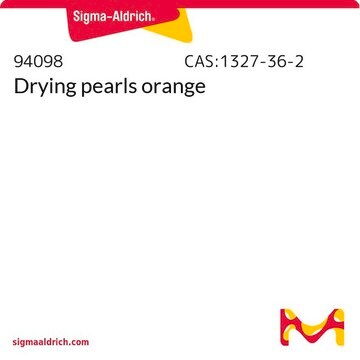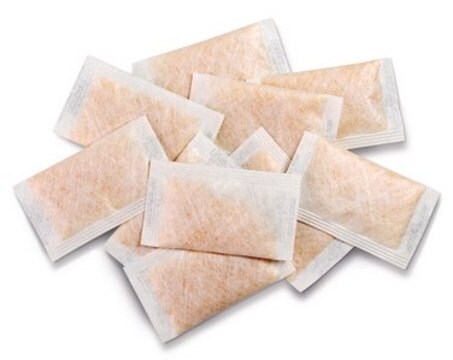1.01972
Silica gel with moisture indicator (brown gel)
desiccant ~ 1 - 4 mm
Synonym(s):
Brown Silica Gel
About This Item
Recommended Products
Agency
suitable for EPA OTM-45
Quality Level
form
granular
surface area
700 m2/g
loss
≤2.0% loss on drying, 150°C
particle size
1-4 mm
pore size
2.0-2.5 nm
pH
2-10 (50 g/L in H2O, slurry)
mp
>1000 °C
storage temp.
2-30°C
General description
Analysis Note
Loss on drying (150 °C): ≤ 2.0 %
Water absorption capacity (24 hrs.,80 % relative humidity): ≥ 20.0 %
Storage Class Code
13 - Non Combustible Solids
WGK
WGK 1
Flash Point(F)
Not applicable
Flash Point(C)
Not applicable
Regulatory Listings
Regulatory Listings are mainly provided for chemical products. Only limited information can be provided here for non-chemical products. No entry means none of the components are listed. It is the user’s obligation to ensure the safe and legal use of the product.
ISHL Indicated Name
Substances Subject to be Indicated Names
ISHL Notified Names
Substances Subject to be Notified Names
Certificates of Analysis (COA)
Search for Certificates of Analysis (COA) by entering the products Lot/Batch Number. Lot and Batch Numbers can be found on a product’s label following the words ‘Lot’ or ‘Batch’.
Already Own This Product?
Find documentation for the products that you have recently purchased in the Document Library.
Customers Also Viewed
Related Content
FAS, or 'forever chemicals,' persist in the environment and pose risks to human health. Discover our environmental monitoring tools for PFAS quantification, aiding researchers, regulators, and labs in testing for PFAS.
Our team of scientists has experience in all areas of research including Life Science, Material Science, Chemical Synthesis, Chromatography, Analytical and many others.
Contact Technical Service


